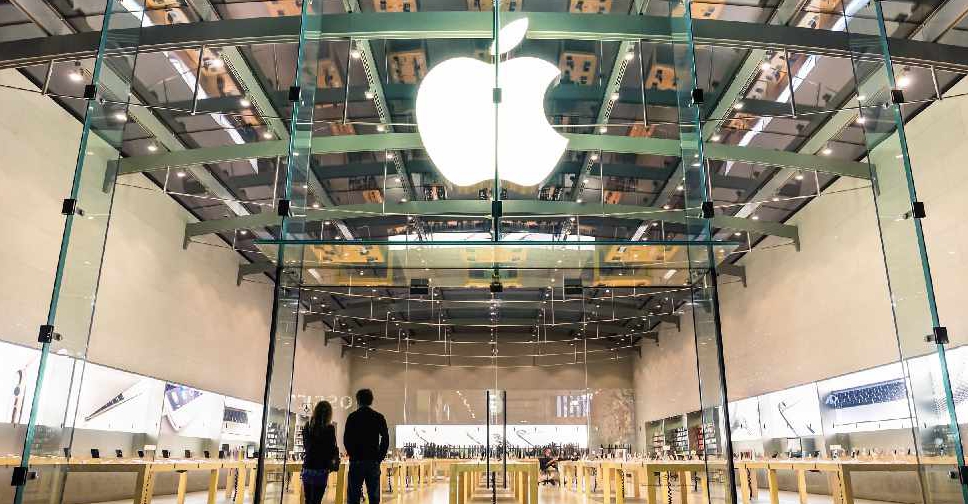
Apple executives on Thursday forecast relatively strong sales growth, a sign the company will recover from a dip in iPhone sales as it rolls out artificial intelligence features.
The forecast comes after Apple delivered a slight drop in iPhone revenues for the holiday shopping quarter and lagged Wall Street estimates, hampered by a lack in some markets of artificial intelligence features meant to be the chief selling point of its latest devices.
Apple Chief Executive Tim Cook said those features will reach more users in Europe this spring, and shares rose 3.14 per cent in post-market trade.
Apple has approached AI more cautiously than many of its peers, eschewing the huge data center spending of rivals such as Microsoft and instead envisioning AI as features meant to help sell its latest hardware.
That approach paid off earlier this week when China's DeepSeek unveiled free AI technology that sparked fears of price wars, sank stocks of some of Apple's competitors and sent shares of the iPhone maker up slightly.
Despite the AI rollout stumbles, Apple's overall sales and profits were boosted by stronger-than-expected sales in its fiscal first quarter of iPads and Macs, where new chips helped persuade customers to upgrade.
And Chief Financial Officer Kevan Parekh gave a rosier outlook for the current fiscal second quarter, saying the company expects sales to rise in the low- to mid-single digit range, after accounting for a negative 2.5 percentage point impact from a strong dollar.
"The guidance management provided on the call exceeded expectations, as the iPhone gains momentum and Apple gets past a tough quarter in China," said Gil Luria, managing director at D.A. Davidson.
In the just-ended quarter, iPhone sales dropped slightly to $69.14 billion, compared with the $71.03 billion that analysts were expecting, according to LSEG data. Greater China sales dropped to $18.51 billion, compared with $20.82 billion a year earlier and below the $21.33 billion that a Visible Alpha survey of five analysts expected.
Total sales of $124.30 billion for the fiscal first quarter ended Dec. 28 inched past Wall Street's target of $124.12 billion, according to LSEG, while earnings per share of $2.40 comfortably beat the consensus target of $2.35.
The iPhone maker has positioned AI as a set of new capabilities and features such as drafting emails and transcribing phone calls, but the company is rolling the features out over time and has not yet secured a local partner in China to release them.
In an interview, Apple CEO Tim Cook said AI features, called Apple Intelligence, are driving sales of the company's new devices.
"We saw that in markets where we have rolled out Apple Intelligence, the year-over-year performance on the iPhone 16 family was stronger than those where Apple Intelligence was not available," Cook said.
While Cook said Apple Intelligence is coming in new languages such as French and German in April, he said there is no timeline for when it will become available in China.
"We continue to work with the regulators and will release it as soon as we can," Cook said.
Cook told Reuters that about half of Apple's 11 per cent decline in China revenues was attributable to changes in how much inventory the company's resellers held.
Mac sales during the last quarter benefited from a new lineup of Mac Minis, iMacs and MacBook Pros with a new M4 chip. Apple Intelligence features are more widely available on Apple's Macs and iPads because their larger size means they have more powerful chips.
"The silicon makes it perfect for running AI workloads, and so I assume that that's a very key compelling reason for people to upgrade," Cook said.
Apple's Mac and iPad sales hit $8.99 billion and $8.09 billion respectively, above estimates of $7.96 billion and $7.32 billion, according to LSEG data.
Apple said its services business, which includes iCloud storage and its streaming music and video services, hit $26.34 billion in sales, up 13.9 per cent from the previous year and above estimates of $26.09 billion, according to LSEG data.
"While the company's cautious approach to AI rollout has drawn criticism, robust services growth and ecosystem expansion are providing crucial momentum to help ease its continued iPhone struggles in China," said Emarketer analyst Jacob Bourne.
The firm's wearables segment, which includes the Apple Watch and AirPods lines, had $11.75 billion in sales, compared with analyst expectations of $12.01 billion, according to LSEG data.



 Nasdaq set to confirm bear market as Trump tariffs trigger recession fears
Nasdaq set to confirm bear market as Trump tariffs trigger recession fears
 Dana Gas and Crescent Petroleum exceed 500M boe in Khor Mor field
Dana Gas and Crescent Petroleum exceed 500M boe in Khor Mor field
 China to impose tariffs of 34% on all US goods
China to impose tariffs of 34% on all US goods
 Shares bruised, dollar crumbles as Trump tariffs stir recession fears
Shares bruised, dollar crumbles as Trump tariffs stir recession fears
 Wall Street futures sink as tariffs fuel recession fears
Wall Street futures sink as tariffs fuel recession fears



